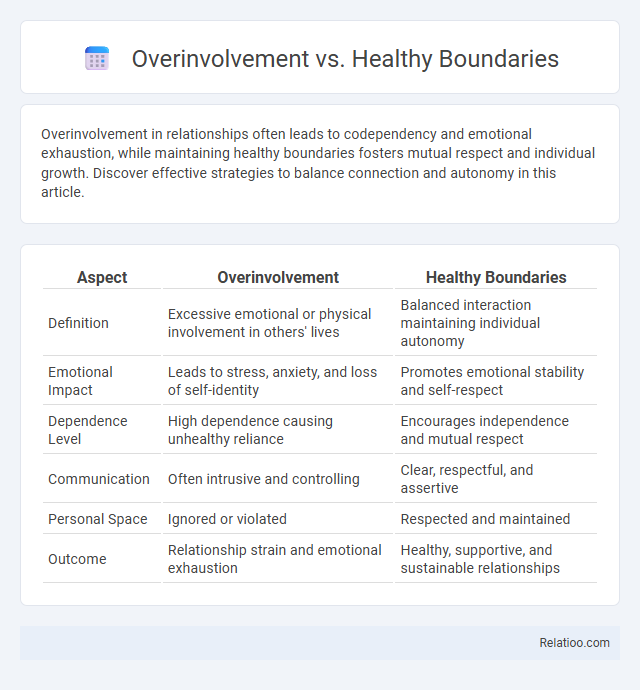Overinvolvement in relationships often leads to codependency and emotional exhaustion, while maintaining healthy boundaries fosters mutual respect and individual growth. Discover effective strategies to balance connection and autonomy in this article.
Table of Comparison
| Aspect | Overinvolvement | Healthy Boundaries |
|---|---|---|
| Definition | Excessive emotional or physical involvement in others' lives | Balanced interaction maintaining individual autonomy |
| Emotional Impact | Leads to stress, anxiety, and loss of self-identity | Promotes emotional stability and self-respect |
| Dependence Level | High dependence causing unhealthy reliance | Encourages independence and mutual respect |
| Communication | Often intrusive and controlling | Clear, respectful, and assertive |
| Personal Space | Ignored or violated | Respected and maintained |
| Outcome | Relationship strain and emotional exhaustion | Healthy, supportive, and sustainable relationships |
Understanding Overinvolvement: Definition and Signs
Overinvolvement occurs when your emotional or physical engagement in someone else's life becomes excessive, leading to blurred personal boundaries and potential stress. Signs of overinvolvement include neglecting your own needs, feeling responsible for others' problems, and difficulty saying no. Recognizing these symptoms helps maintain healthy boundaries, ensuring balanced and respectful relationships.
What Are Healthy Boundaries?
Healthy boundaries define the limits that protect your emotional well-being and personal space, ensuring relationships remain respectful and balanced. They involve clear communication of needs and limits without overstepping or becoming overly enmeshed in another person's life. Establishing healthy boundaries helps prevent overinvolvement, fostering independence and mutual respect in all types of relationships.
Emotional Impact of Overinvolvement
Overinvolvement in relationships often leads to emotional exhaustion, heightened stress, and blurred personal boundaries, which can negatively impact your mental well-being. Establishing healthy boundaries promotes emotional resilience by allowing space for individual growth and preventing feelings of resentment or dependency. Recognizing the emotional impact of overinvolvement helps you maintain balanced connections that support both personal and relational health.
Benefits of Setting Healthy Boundaries
Setting healthy boundaries promotes emotional well-being by preventing overinvolvement in others' problems, which can lead to stress and burnout. Your ability to establish clear limits cultivates respect and mutual understanding in relationships, ultimately enhancing personal autonomy and mental clarity. These benefits foster balanced interactions that support long-term emotional resilience and self-care.
Common Causes of Overinvolvement
Overinvolvement often stems from unresolved personal insecurities, a strong desire to control outcomes, or difficulty trusting others, leading to blurred lines between help and interference. Healthy boundaries, by contrast, maintain respect for individual autonomy and promote balanced relationships, preventing emotional burnout. You can foster emotional well-being by recognizing these root causes, setting clear limits, and encouraging independence within your interactions.
How to Recognize Unhealthy Boundaries
Unhealthy boundaries often manifest through overinvolvement, where you may feel responsible for others' emotions or decisions to the detriment of your own well-being. Signs include difficulty saying no, excessive people-pleasing, and persistent anxiety about disappointing others, which interfere with personal autonomy. Recognizing these patterns helps establish healthy boundaries that respect both your needs and others' independence.
Strategies to Establish Healthy Boundaries
Establishing healthy boundaries requires clear communication of your limits and consistent reinforcement to prevent overinvolvement in personal or professional relationships. Strategies include setting specific time limits, prioritizing self-care, and learning to say no without guilt to maintain emotional well-being. You can cultivate balanced interactions by recognizing signs of overinvolvement and actively practicing assertiveness to protect your mental and physical health.
Overinvolvement in Relationships: Risks and Consequences
Overinvolvement in relationships often leads to blurred personal boundaries, causing emotional exhaustion and loss of individual identity. This excessive entanglement can foster dependency and resentment, undermining mutual respect and trust. Your emotional well-being depends on establishing healthy boundaries to prevent the harmful risks and consequences associated with overinvolvement.
Tips for Maintaining Balanced Relationships
Maintaining balanced relationships requires setting clear and healthy boundaries to prevent overinvolvement, which can lead to emotional burnout and loss of personal identity. Your ability to communicate your limits respectfully and recognize when others are overstepping helps preserve mutual respect and autonomy. Prioritize self-awareness and consistent boundary reinforcement as key strategies for fostering sustainable and fulfilling connections.
When to Seek Professional Help for Boundary Issues
Recognizing when to seek professional help for boundary issues is crucial, especially when overinvolvement leads to emotional exhaustion, loss of personal identity, or codependent behaviors. Healthy boundaries enable individuals to maintain self-respect and mutual respect in relationships, but persistent difficulty setting or enforcing these limits may require therapy for developing assertiveness and emotional regulation skills. Mental health professionals specialize in addressing boundary violations, helping clients establish clear limits, improve communication, and foster balanced interpersonal dynamics.

Infographic: Overinvolvement vs Healthy Boundaries
 relatioo.com
relatioo.com